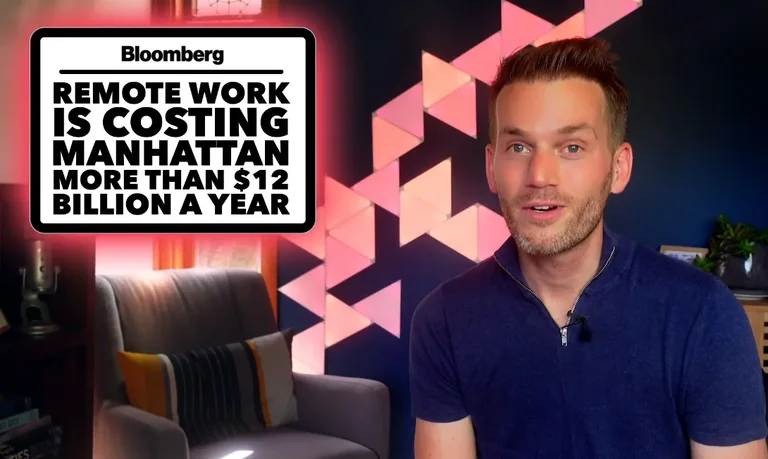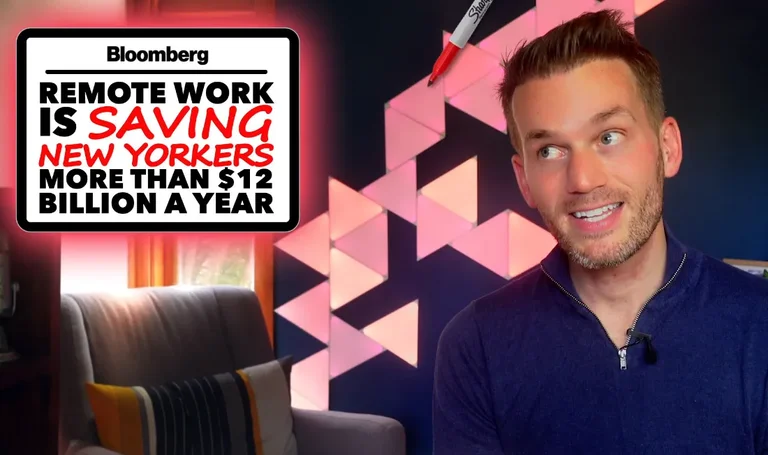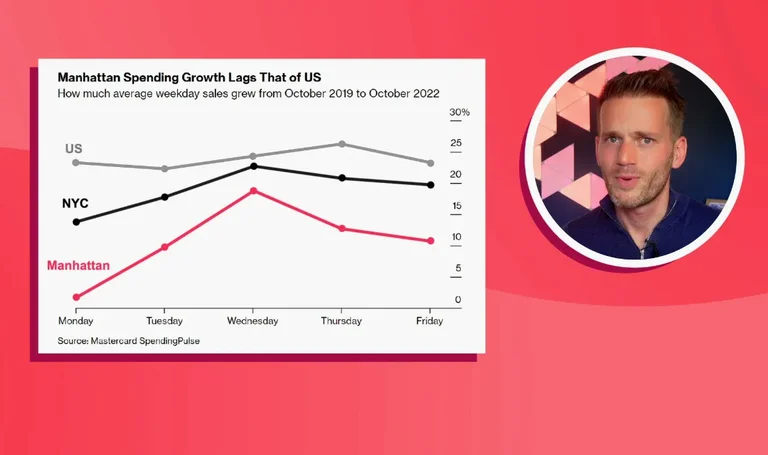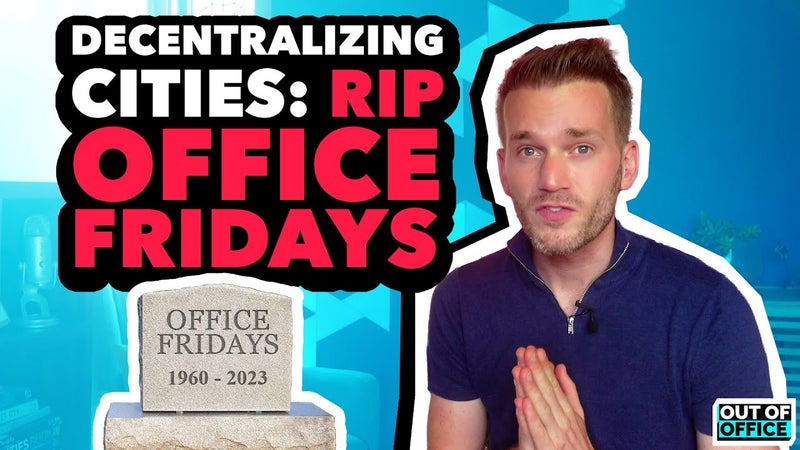Contents
- Hey, Welcome Back!
- A Real Loss: Cities Are Furious Over WFH Fridays
- Decentralizing Cities: The Real Cost of City Expansion
- City Value: What People Want from Their Cities
- This Week’s Shareable
- Latest Remote Jobs
A serious loss has been suffered. The death of office Fridays has sparked mourning in cities everywhere. But it’s not remote workers struggling with grief.
💰 Bloomberg: Remote Work Costs NYC Big
🌆 New York Times: Expanding the City
🌊 Yahoo: Climate Change Risk for Cities
🤗 Forbes: Remote Work Makes People Happier
Hey, Welcome Back!
Have you heard?
Office Fridays have sadly passed on.
Tuesday to Thursday, it’s business as usual in Manhattan. But Monday and Friday? Something terrible has happened, and it’s causing widespread outrage as lunch queues thin out, subway cars become less nightmarish, and bars have available seating again.
In this week’s episode we explore why there’s so much anger around WFH Fridays in cities all around the US. And why this perspective is not in the best interests of remote workers.
Let’s crack on -
A Real Loss: Cities Are Furious Over WFH Fridays
Let’s be clear. Remote workers are not the ones in mourning. We’re happy to be in our comfortable homes on Fridays, with our stuff, our families and our dogs.
It’s also pretty fantastic that we can work productively from home too. From our perspective, office Fridays should have been dead and buried a long time ago.
It’s cities that are upset we’re no longer chained to our cubicles. Cities and a long list of old-fashioned CEOs who want to hit pause on 80’s workplace culture.
Making headlines this week is a Bloomberg article that details just how much damage these cities are taking from the absence of people on Fridays.
📰 “Remote Work is Costing Manhattan More Than $12 Billion a Year,” says the article.

According to authors Emma Court and Donna Borak,
“New data on in-person work analyzed by Bloomberg News show that in a number of cities across the US, Fridays at the office are dead. Mondays are a crapshoot. And returning to pre-pandemic work schedules looks like a lost cause.”
Before you break out the champagne and cake, this is a bad thing says the authors, because it comes at an economic cost. Turns out cities are blaming remote work for this devastating loss of income.
In my opinion the headline should read:
✍️ “Remote Work is Saving New Yorkers More Than $12 Billion a Year.”

That’s more like it.
Decentralizing Cities: The Real Cost of City Expansion
This week we’re looking at the shift from concentrated to decentralized cities. And why, despite that ridiculous Bloomberg headline, it’s a good thing for nearly everyone.
🔀 First can we all agree – instability and rapid change is everywhere.
It’s impacted the lives of remote workers in the recent tech layoffs, and it was bound to impact cities as well. Our habits and behaviors have fundamentally shifted.
It’s not cause for panic – it’s progress!
Our entire capitalist society is built around navigating this type of sweeping change.
Don’t get me wrong. Everyone is sad when their favorite lunch bar closes. But this is far from claiming that Manhattan is losing $12+ billion a year because of remote work.
🙀 That’s less a stretch and more a blatant lie.
🥪 Just because someone isn’t spending $18 on a sandwich in Midtown doesn’t mean they’ve stopped eating. They’re supporting local businesses where they live.
🚇 New York’s subway system has been struggling for decades. The demand at rush hour is too high - not even multiple multimillion dollar projects can fix it.
🚏 Reduction of demand at peak times means a fortune will be saved from projects like these. It means rolling out work faster on Fridays that actually gets done, or cancelling projects entirely to divert funds to other much-needed areas.
Bloomberg came up with $12+ billion by twisting the words of our favorite Stanford economist, Nick Bloom.
Here’s how they did it.
According to them – fewer human sardines in skyscrapers means missed restaurant and retailer sales. And these sales are the linchpin of New York’s economic engine.
Using Bloom’s data, they calculated loss of spend per worker and compared it to spend back in 2019. Yes, before the pandemic changed everything - when the world was completely different.
🙄 The average worker is spending $4661.00 less per year near their offices in NY

And there are three things driving this stalled engine.
1. An outbreak of office vacancies
2. A transit system in freefall
3. And less income tax being paid in NY State
If it sounds a little too dramatic to you, that’s because it is.
Using this argument to try and force people back into the office is total bullshit.
There are better ways to move forward.
City Value: What People Want from Their Cities
Let’s reframe this argument from the POV of people who live and work in big cities.
1. 🌲 More Space
It’s not healthy for cities to continually get more concentrated. More buildings, smaller apartment sizes and higher living costs don’t improve quality of life.
No-one can afford to live in New York anymore!
Instead of more people, what the city needs is a contraction to make more space for those who remain. Imagine a city with enough space for the people who live there.
2. 🌞 Climate Safety
Cities aren’t prepared for future climate change trouble. We have floods, diseases and more on the horizon. It threatens concentrated cities the most.
New York is #11 on the list of 25 US cities most vulnerable to climate change.

Decentralizing is natural reaction to a pandemic, and makes us all better off when something like this happens again. And if there’s one thing we know - it’s that something like this will happen again.
3. 🥰 Greater Happiness
When I lived in New York, I hated people.
I once saw my four-foot boss shove a tourist in the back to get past him. Having to dodge thousands of tourists to get anywhere gets old real fast.
Forbes recently reported that people are 20% happier at home. I mean, you don’t have to wait for service there. And isn’t happiness the goal?
If I still lived in a city like New York, I’d be ecstatic to see the back of office Fridays. No more commutes, endless lunch lines, or overpriced evening drinks.
But maybe it’s just me – what do you think? I’m waiting to hear your side of the story.
🏡 Tell me how your city has decentralized since the pandemic struck, and if its been better or worse for you.
🕊️ In the meantime – RIP office Fridays: you won’t be missed.
🗺️ Quick Announcement: I’ve been on the road chatting to remote workers all over the world. Episodes coming soon! It’s been a wild ride and I can’t wait for you to see them.
That’s all for this week – and remember, the future of work is Out of Office.
Andrew
This Week’s Shareable
- Who exactly is mourning the loss of office Fridays? Not remote workers. A shift has happened from concentrated to decentralized cities. And cities are furious about it! They put the blame squarely on remote work. This week’s episode takes a closer look at the perspective that really matters. #remotework #WFHfridays
Latest Remote Jobs
Switch to remote work and do what you love from anywhere. Apply here 🙋♀️
💥 VP of Value Assurance at Aurea Software, $200K ($100/hour)
💥 VP of Product Management at Totogi, $200K ($100/hour)
💥 Python Serverless Developer at Forward Kitchens, $60K ($30/hour)








